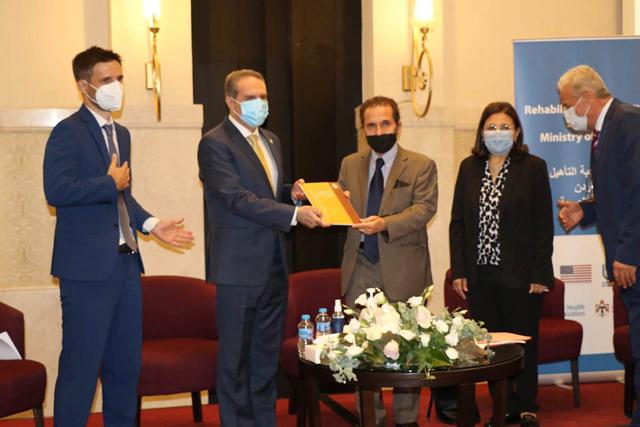- Local News
- Web-2021-07-28 | 02:12 pm

Nayrouz News Agency :
Under the patronage of HH Prince Mired, the president of the Higher Council for the Rights of Persons with Disabilities, the Ministry of Health on Tuesday launched the National Strategy for Rehabilitation (2020-2024) in cooperation with the World Health Organisation (WHO) and the Humanity and Inclusion Organisation, the Jordan News Agency, Petra, reported.
In his speech, the prince stressed the importance of the strategy, as it represents an important step towards framing rehabilitation services and ensuring they have high quality standards. The strategy also frames important measurements to ensure it is sustainable and can develop according to the actual needs of beneficiaries, who must also be partners in the evaluation process.
His Highness highlighted the importance of accessible rehabilitation services as a means to achieve participation and integration in society. He added that the rehabilitation services are critical to enable persons with disabilities to exercise their rights and freedoms and engage in their daily activities independently and privately.
According to the prince, the strategy can be materialised through investing in physical and sensory capabilities and optimal use of assistive tools and technology, in line with the law and the Convention on the Rights of Persons with Disabilities, in order to reach an integrated system of services that include detection and rehabilitation programmes, and clear and effective mechanism that help prevent the aggravation, or multiplication of disabilities.
Minister of Health Feras Al Hawari emphasised that the Ministry of Health plays a leading role in providing rehabilitation services. He added that these services are offered in most of the ministry’s hospitals.
Hawari stated the ministry’s approval and support for the establishment of a national rehabilitation centre falls under their goals to implement and develop rehabilitation services.
The minister also indicated that the Ministry of Health was able to maintain the quality of health services they provide to everyone in the Kingdom, despite the difficult circumstances posed by the coronavirus pandemic.
He highlighted the ministry’s endeavour to achieve the Royal vision on health, in partnership with the relevant authorities. He particularly cited the ministry’s focus on rehabilitation services as a fundamental aspect of comprehensive health coverage.
Head of Violence, Injury and Disability Affairs in the WHO Regional Office in the Middle East, Hala Sakr, noted the organisation’s support for Jordan to partake in the WHO 2030 Rehabilitation Initiative, to support rehabilitation and improve the lives of everyone.
Sakr pointed out that Jordan was one of the first countries in the region to adopt WHO tools to develop rehabilitation strategies, stressing that the Kingdom’s strategy serves as a great example.
Federico Dessi, the director of Operations at the Humanity and Integration Organisation, indicated that the organisation has played a major role in supporting Syrian refugees and providing them with quality health services, especially in the field of rehabilitation. He noted that the organisation has also supported the rehabilitation strategy from its initial stages and that they will continue to provide support throughout its implementation









